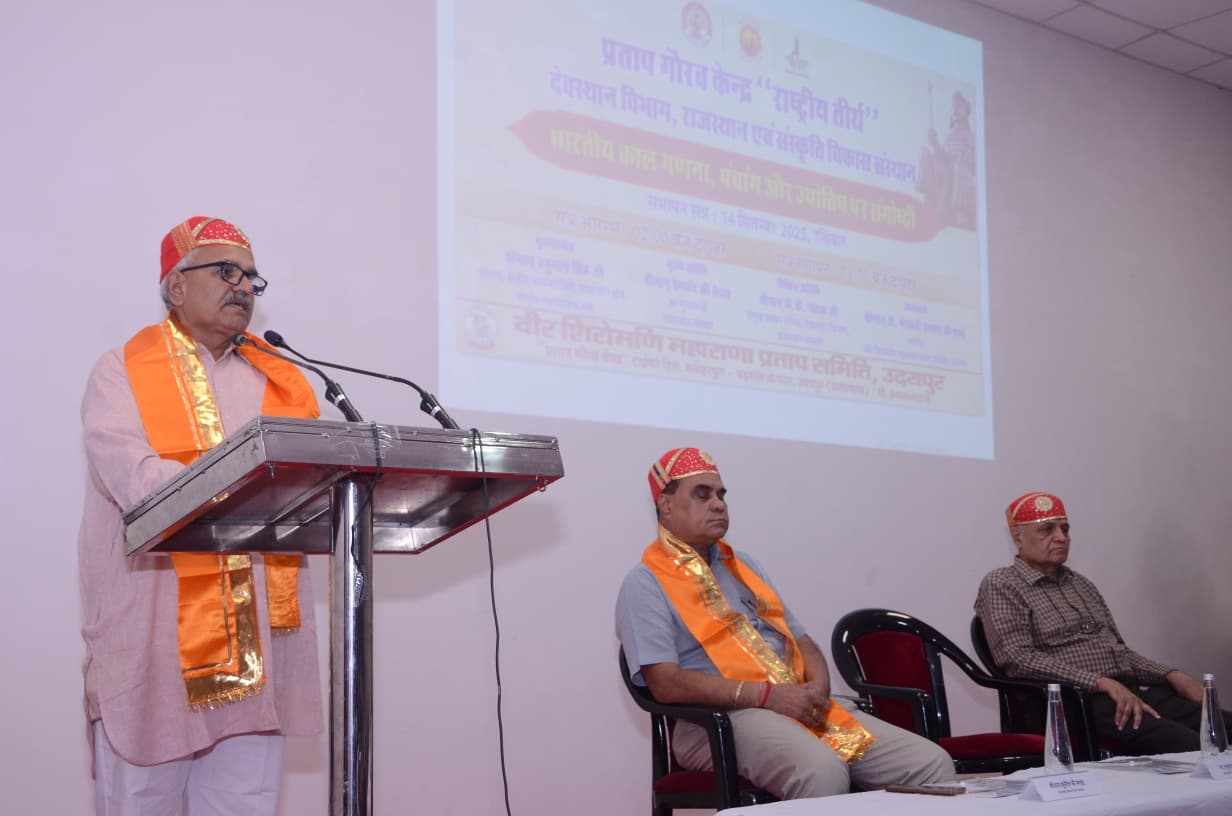The Intellectual Churning from Mewar Must Continue – Hanuman Singh

Udaipur. The deliberations held in Mewar on Indian Chronology, Panchang, and Astrology can rightly be called a “Shastrarth” (intellectual discourse), as in the ancient Indian tradition where philosophical truths were established through such debates. Over the course of this two-day international seminar, scholars presented significant research papers highlighting the antiquity and scientific foundation of Indian chronology.
Speaking at the valedictory session at Pratap Gaurav Kendra – Rashtriya Teerth, chief speaker and RSS regional executive member Hanuman Singh said that the initiative which began in Mewar must flow continuously. He urged that an All-India committee of scholars be formed to restore India’s ancient knowledge systems on the global stage.
He noted that the Indian calendar is far more accurate and ancient than the Gregorian system, and scholars must explain it in contemporary language so that common people can understand and take pride in it. Singh reminded the audience that when Western thinkers like Ptolemy in the 2nd century were calling the Earth flat, Indian astronomer Aryabhata was already researching the cosmos from Taregana village in Bihar—a site later identified by NASA in 2009 as the best location to study a solar eclipse.
Tracing the historical roots, Singh pointed out that the British, under Lord Macaulay, deliberately attempted to alienate Indians from Sanskrit and their heritage. He emphasized that today, even countries like Japan are developing software based on the Indian chakra system for health diagnostics. Indian scholars of chronology and astrology, he said, must collaborate with technology experts to explore similar innovations.
Extending the thought, Prof. B.P. Sharma, President of the Veer Shiromani Maharana Pratap Committee and chair of the session, said that scholars should embrace artificial intelligence (AI) to make ancient calculations more accessible and accurate. He illustrated how descriptions in ancient scriptures often align with archaeological findings—for example, the Ramayana mentions elephants with four tusks, a species paleontologists say existed over a million years ago. Such connections, he said, reaffirm the timelessness of India’s chronology, with astrology serving as the “eye of the time cycle.”
Chief Guest Sunil Mattad, Deputy Commissioner of the Devasthan Department, praised the seminar for moving meaningfully towards its objectives and assured continued departmental support for initiatives preserving India’s ancient traditions.
Seminar coordinator Dheeraj Boda, co-convener Himanshu Paliwal, Prof. Madan Singh Rathore, Ashok Purohit, and Anurag Saxena welcomed the guests, while Dr. Vivek Bhatnagar presented the seminar report. The sessions were conducted by Prof. Sudarshan Singh Rathore.
Scholars such as Ravi Shankar (New Delhi), Dr. Alaknanda Sharma (Udaipur), Chandrashekhar Pancholi (Udaipur), Dr. Om Prakash Pandey (Delhi), Dr. Suraj Rao (Ajmer), Dr. Dharmveer Sharma (Delhi), Acharya Lokesh (Noida), Acharya Pramod (Nepal), Arun Upadhyay (New York), Dr. Akhand Pratap Singh (Udaipur), and many others presented their research papers.
Officials from the Devasthan Department, including Assistant Commissioner Jatin Kumar Gandhi, Inspector Shivraj Singh Rathore, and other dignitaries, were also present.
साभार :
© CopyRight Pressnote.in | A Avid Web Solutions Venture.






